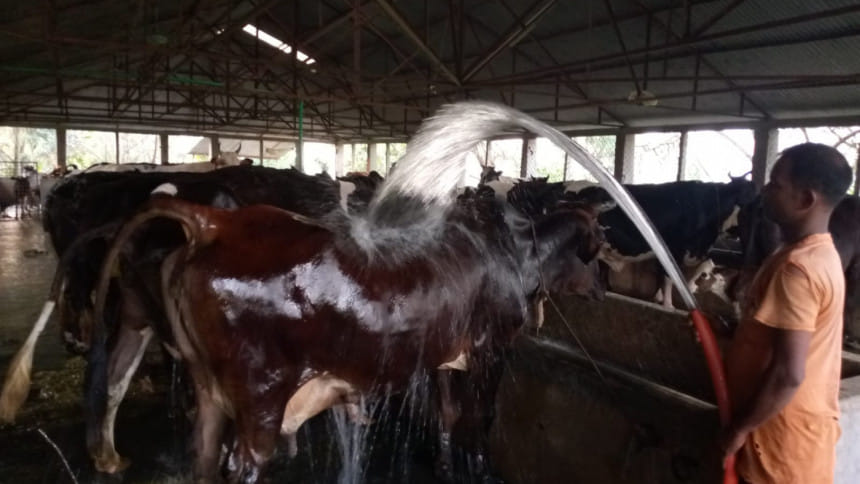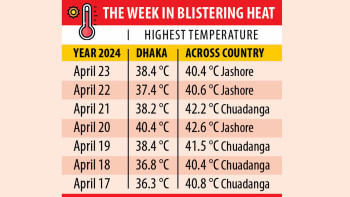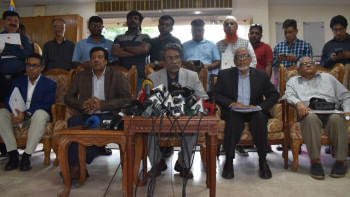Heat stress jeopardises dairy industry

Lutfor Rahman, a farmer in Jote-Adom village in Pabna's sadar upazila, is preparing four cows with a target to sell them during the upcoming Eid-ul-Azha when millions of sacrificial animals are slaughtered. However, he is now worried whether the animals will survive amid the ongoing heatwave.
He was expecting a minimum 500 grammes to 600 grammes of weight increase daily in the fattening period. However, he is struggling to retain the original weight due to the heatwave.
The dairy farmer and his wife and children are doing whatever they can to keep them alive. Now they make the animals shower at least three times a day.
He has also put in place a table fan for each cow to give them some relief from the sweltering heat. This, however, has added extra expenses for the farmer.
"The cows are going to be fattened, so we need to take special care of them to keep them cool," Rahman said.
He is not the lone dairy farmer in Bangladesh who has been impacted by the current spell of record temperatures.
There are around 2.5 crore cows and 13 lakh to 14 lakh farmers in the country. Of the farmers, 3.5 lakh own large farms, according to the Dairy Farm Owners Association in Bangladesh.
Md Saiful Islam, one of the leading dairy farm owners in Pabna's Faridpur upazila, says the maintenance cost has increased by Tk 100 to Tk 150 per cow due to a hike in labour and feed costs.
The higher cost comes after the price of wheat bran and other dry feeds has gone up by Tk 100 to 150 per bag in the last few weeks, he said.
During normal times, each cow drinks 18 to 20 litres of water a day. The water consumption has gone up to 25 to 30 litres amid the unprecedented level of higher temperatures.
Each large-sized cow needs more than usual showers a day to keep their bodies cool. This has raised the cost of labour as well.
Islam has 60 cows on his farm and most of them are milk-producing. The farm currently employs six workers, up from four workers before the onslaught of the heatwave.
"The labour cost, electricity bills and feed costs have gone up to maintain the farm," he said, adding that the maintenance cost has risen by Tk 500 to Tk 700 per cow per week.
Md Raju Ahmed, a dairy farmer in Ramkharua village in Shahjadpur upazila in Sirajganj, claimed milk production has reduced.
"Normally, we get 22 litres to 25 litres of milk from each cow a day. After the severe temperatures hit the country, each cow is now giving 18 litres to 20 litres of milk."
Regular load-shedding has emerged as a major concern for dairy farms trying to tackle the current situation.
Mohammad Imran Hossain, president of the Dairy Farm Owners Association, said due to the strong heatwave, the dairy sector has been badly affected.
The maintenance cost has increased by 10 to 15 percent while milk production has fallen by a minimum of 25 percent, he claimed.
"Our animals are not heat-tolerant. We are mostly farming the local varieties and they are not able to tolerate the extreme hot we are witnessing this year."
Hossain said firms' maintenance cost has jumped up by 10 percent to 15 percent in order to manage heat.
"This is an additional burden for dairy farmers."
The risk of miscarriage of pregnant cows is another major concern for the farmers, Hossain claimed.
He warned that if the heatwave persists for a few more weeks, the price of meat will climb and sacrificial animals may be dearer during Eid, which will be celebrated in the middle of June.
Hossain urged the government to breed heat-tolerant cow varieties in order to save the dairy sector since heatwaves might be more common in Bangladesh in the coming years owing to climate change impacts.

 For all latest news, follow The Daily Star's Google News channel.
For all latest news, follow The Daily Star's Google News channel. 









Comments